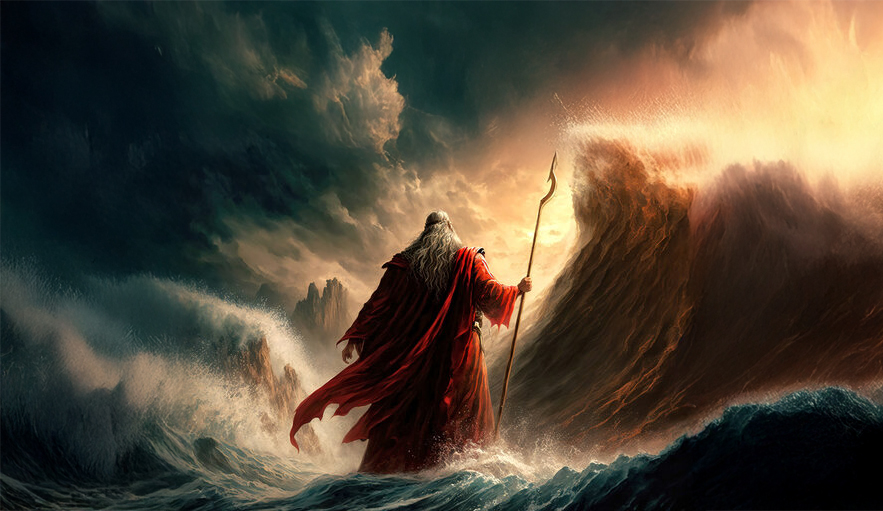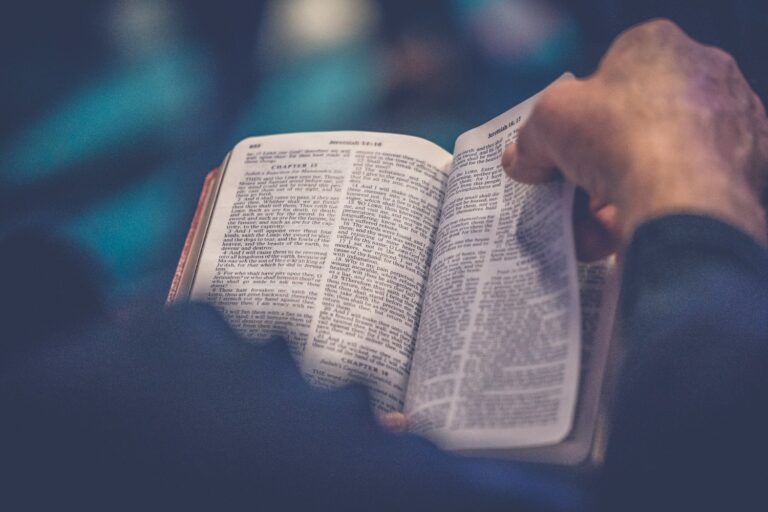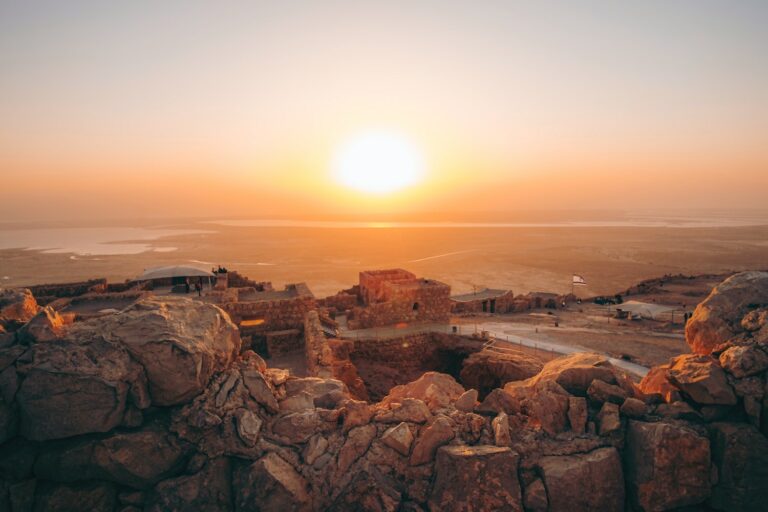Passover: God's Faithfulness Established
Published By: Irene Petrakis, ICEJ Australia
This year marks one of the rare occasions when Passover and Easter coincide. For Christians, Passover holds deep significance, symbolising the ultimate sacrifice of Christ – our Passover Lamb (1 Corinthians 5:7). Jesus’ crucifixion occurred during Passover, now commemorated on Good Friday. Just as the blood of the lamb saved the Israelites from judgment and led to their deliverance from slavery (Exodus 12), so the blood of Jesus offers salvation, exempting us from God’s judgment and delivering us from the consequences of sin.
This connection explains why early Christians, who were mostly Jewish, celebrated Jesus’ death and resurrection during Passover. However, in AD 325, at the Council of Nicaea, Emperor Constantine sought to separate the concurrent observance of these festivals to emphasise Christianity’s break from Judaism. It was in this context that Constantine declared, “We ought not, therefore, to have anything in common with the Jews”, reflecting the anti-Judaism at the heart of this decision.
This had unfortunate consequences, leading Christians throughout history to overlook the significance of Passover and further fuelling Christian anti-Judaism. However, with Passover and Easter aligning this year, we are presented with a timely opportunity to reflect on the importance of Passover, stand against antisemitism, and join the Jewish community in remembering the Exodus, as God commanded (Exodus 13:3). Recognising the relevance of Passover today is one way to counter the anti-Judaism perpetuated by Constantine and others throughout history, especially given the present-day hostility towards the Jewish people.
God’s Faithfulness To Israel
Passover is a powerful reminder of God’s faithfulness to Israel and His unbreakable covenant with Abraham, which endures to this day. God rescued the Israelites from Egyptian slavery to fulfill His promises to Abraham and demonstrate His unwavering commitment to His chosen people. Just as God heard Israel’s cries and delivered them from Pharaoh’s oppression, He will always deliver Israel from those who seek to destroy her.
In Genesis 12:1-7, God had promised Abraham that his descendants would become a great nation, and that through him, all nations would be blessed. God also promised that Abraham’s offspring would inherit the land of Canaan – the Promised Land. In Genesis 15, God affirmed the unconditional nature of this covenant. During the covenant ceremony, God alone passed between the animal halves while Abraham slept (Genesis 15:12-20), symbolising that the covenant’s fulfillment depended solely on God’s faithfulness, not on Abraham. Thus, had Israel remained under the yoke of slavery, unable to enter the Promised Land, it would have called into question God’s trustworthiness and ability to fulfill His promises. Therefore, due to the unbreakable covenant, the suffering of the Israelites in Egypt demanded a response from God: “God heard their groaning, and God remembered His covenant with Abraham, Isaac, and Jacob (Exodus 2:24).
Additionally, throughout Exodus, God consistently identifies Himself as the God of Abraham, Isaac, and Jacob (Exodus 3:6; 4:5). God attached His very name to Israel and thus His own reputation would be at stake if Israel was not delivered. Not only did God deliver the Israelites, but He used plagues and miracles to demonstrate His superiority over the Egyptian gods and to judge Pharaoh for oppressing them. This serves as a warning for antisemites today – to offend Israel is to offend the God of Israel, an act that carries severe consequences.
Passover symbolises God’s role as a liberator, always faithful to His promises, and highlights the unbreakable nature of His covenant with Abraham. Just as God could be trusted to intervene when His covenant was at stake, so we can place our trust in God’s faithfulness today. God will not stand idly by when His people face adversity, nor will He ever give up on them. He hears the cries of those suffering, including the Israeli captives in Gaza today, and will bring judgment upon their captors, just as He judged Pharaoh.
A Symbol Of God’s Love And Grace
Passover also serves as the ultimate demonstration of God’s lovingkindness and grace, showing His commitment to saving not just Israel but all of humanity. When God created Adam, He intended for him to be His “agent” on earth, mandating humanity to steward creation (Gen. 1:26-29). While the Fall of man complicated this mandate, God had a plan to resolve this through the seed of woman (Genesis 3:15) – the Messiah – brought forth from Israel, who would be used as God’s agent in His plan for redeeming creation from the effects of the Fall.
After the Tower of Babel and the separation of nations, God chose Israel specifically to be His agent on earth, assigned with the mission originally given to Adam. The Exodus narrative confirms that Israel represented God’s new steward on earth, a sort of microcosm of humanity – tasked with being a light to the nations and initiating God’s plan to restore creation to what was originally intended. This is why God attached His very reputation to Israel, and it is no wonder that Israeli Prime Minister Benjamin Netanyahu once said, “The story of Israel is a parable for all humanity.” In this way, elements of the Exodus echo the creation story itself. For instance, through the Exodus, God brought order out of chaos by parting the Red Sea, mirroring how He brought order out of chaos from an earth that was formless and void (Genesis 1:2). The crossing of the Red Sea also represents a mikvah or baptism, signifying becoming a new creation.
The Passover thus underscores Israel’s special mission as God’s agents, which involves bringing about the renewed creation that will come with the Messiah’s return. It shows that God does not give up on Israel, no matter their actions, just as He did not give up on humanity as a whole after the Fall.
God also used His miraculous deliverance in the Exodus to show the Israelites His love for them and to inaugurate them as His people and “treasured possession”. This is why He consistently reminds the Israelites of the Exodus: “You yourselves have seen what I did to the Egyptians, and how I bore you on eagles’ wings and brought you to myself. Now therefore, if you will indeed obey my voice and keep my covenant, you shall be my treasured possession among all peoples, for all the earth is mine; and you shall be to me a kingdom of priests and a holy nation…” (Exodus 19:4-6). In this manner, God uses the Exodus to “charm” Israel into becoming His bride and entering into a marriage covenant with Him. After Moses sets forth God’s commandments, the people answer God and say, “All that the LORD has spoken we will do” (Exodus 19:8), akin to saying “yes” and reciting the marriage vow. This also mirrors the Christian relationship with God today, with the body of Christ considered the “bride” of Christ.
In this respect, Passover also challenges the false dichotomy that many Christians hold today: that Judaism and the Old Testament present a works-based religion, in contrast to the grace of the New Testament. However, Passover dispels this narrative, showing that the God of Israel has always been a God of grace. God rescued Israel through a miraculous act of grace and deliverance, not because of their own efforts or merit. Just as God created humans in His image to be in relationship with Him – not out of necessity but because of His gracious and loving nature – so He chose Israel for a special relationship with Him.
God’s deliverance of the Israelites was the ultimate act of grace, and they were subsequently called to follow the Torah, not as a means of salvation, but to be a light to the nations. Similarly, Christians are saved by grace, freed from the bondage of sin, and called to live in obedience to God to be a light to the world (Matthew 5:14). This reminds us that, although we are saved by grace, we are also called to live holy lives in light of this grace, being careful not to revert back to the “Egypt” of our former lives.
Our Blessed hope
Passover also carries profound prophetic significance, inviting us not just to look back but to look forward with hope to the Messiah’s return – our blessed hope (Titus 2:13). Most Christians understand that Passover foreshadowed Christ as our Passover Lamb; but what many overlook is that this is only a partial fulfilment. There are elements of Passover that still await fulfillment at Christ’s return and Israel’s final restoration.

Communion, instituted during Passover, points to these future promises. When Christians partake in communion, they remember Christ’s death and proclaim His return (Luke. 22:14-18; 1 Corinthians 11:26). Jesus declared He would not eat or drink of it again “until it is fulfilled in the kingdom of God,” referring to the coming messianic kingdom. Thus, both communion and Passover point us toward Christ’s return – our blessed hope – and the ultimate Passover banquet to come.
Jesus also referred to the cup of this Passover meal as the “New Covenant” in His blood (Luke 22:20). While Christians rightly focus on the cleansing power of this blood, they often overlook that the New Covenant is only partially fulfilled. The prophets connected the New Covenant not only with the outpouring of the Spirit but also with Israel’s restoration to the land. For example, echoing Jeremiah 31:31-34, Ezekiel connects the New Covenant, or the “everlasting covenant”, in which the law will be written on Israel’s heart, to Israel’s restoration to the land (Ezekiel 36:24-29; 37:24-28) Thus, while the Passover allowed Israel to journey to the Promised Land, a greater restoration still awaits fulfillment. In this way, Passover also points to the fulfillment of the New Covenant, when all of Israel will receive the Holy Spirit and dwell in the Promised Land forever, as God promised to Abraham.
But this is not the only prophetic aspect of the Exodus. The prophets foretold there would be a “second Exodus” which would surpass the first and precede Israel’s ultimate restoration. For example, Jeremiah 16:14-15 states, “Therefore, behold, the days are coming, declares the Lord, when it shall no longer be said, ‘As the Lord lives who brought up the people of Israel out of the land of Egypt,’ but ‘As the Lord lives who brought up the people of Israel out of the north country and out of all the countries where He had driven them.’ For I will bring them back to their own land that I gave to their fathers.” This is this future restoration that Christians and Jews alike look forward to, which will result in the Messiah ruling and reigning from Jerusalem over a restored Israelite kingdom.
Additionally, just as Exodus presents God as a divine warrior who fights for Israel (Exodus 14:14), so the Messiah will be our divine warrior when He returns and again fights on Israel’s behalf. For example, Zechariah 14:3 presents God in similar terms to the Exodus: “Then the Lord will go out and fight against those nations as when He fights on a day of battle.” This is followed by the Lord’s feet standing on the Mount of Olives and establishing His kingdom over all the earth (Zechariah 14:3-9). Additionally, Isaiah 11:15-16 and Zechariah 10:10-11 invoke imagery echoing the parting of the Red Sea, suggesting that God will dry up the Nile River to facilitate passage from exile and to the Promised Land. It is no wonder, then, that the judgement plagues in Revelation also closely mirror the plagues that God used to judge Egypt. Moses’ work in leading the Jewish people out of exile to enter the Promised Land foreshadows the Messiah’s miraculous work in delivering the Jewish people from exile and back to the land in a greater Exodus to come.
Thus, when we look to Passover, we not only look to the Israelites’ past deliverance from slavery but also look to God’s final judgment to come and a greater Exodus when Israel will be fully delivered and restored, ultimately leading to the restoration of creation itself.
Remembering the Exodus

This year, we are called to join the Jewish people in remembering Passover – not just in remembrance of Israel’s liberation from slavery, but of God’s ongoing faithfulness to both Israel and His creation. Throughout Scripture, God commands us to “remember” these events, which point to His grace, mercy, and faithfulness (Exodus 12:14-27; Deuteronomy 16:1-8).
However, as we celebrate Passover, we must not only look back but also look forward to the ultimate freedom that will come with the return of the Messiah, fulfilling God’s promises to Abraham and establishing a kingdom of peace.
In light of current events since October 7, 2023, let us also stand with the Jewish people, praying for their protection and wellbeing, as forces reminiscent of Pharaoh seek to destroy Israel. Knowing God is the ultimate liberator, let us also pray for the release of hostages in Gaza, asking God to deliver them as He did the Israelites over 3,000 years ago.




